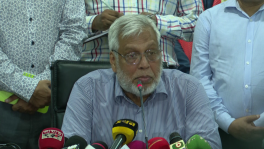Netanyahu to meet Trump at White House as Israel, Hamas discuss ceasefire
Trump and his top aides appeared to be trying to seize on any momentum created by the weakening of Iran, which backs Hamas, to push both sides for a breakthrough in the 21-month Gaza war

Israeli Prime Minister Benjamin Netanyahu was due to meet with US President Donald Trump at the White House on Monday (7 July), while Israeli officials held indirect talks with Hamas aimed at securing a US-brokered Gaza ceasefire and hostage-release deal.
Netanyahu's visit follows Trump's prediction, on the eve of their meeting, that such an agreement could be reached this week.
Before heading to Washington, the right-wing Israeli leader said his discussions with Trump could help advance negotiations underway in Qatar between Israel and the Palestinian militant group.
It was Trump's third time hosting Netanyahu since returning to office in January, and comes just over two weeks after the president ordered the bombing of Iranian nuclear sites in support of Israeli air strikes. Trump then helped arrange a ceasefire in the 12-day Israel-Iran war.
Trump and his top aides appeared to be trying to seize on any momentum created by the weakening of Iran, which backs Hamas, to push both sides for a breakthrough in the 21-month Gaza war.
Netanyahu, who arrived overnight in Washington, was scheduled to meet Trump's Middle East special envoy Steve Witkoff and Secretary of State Marco Rubio on Monday in preparation for his talks with the president.
The two leaders will have a private dinner, listed by the White House as closed to the press, instead of formal talks in the Oval Office where Trump has usually hosted Netanyahu and other visiting dignitaries.
It was not immediately clear why Trump was taking a lower-key approach with Netanyahu this time.
Israel is hoping that the outcome of its conflict with Iran will also pave the way for new diplomatic opportunities in the region.
Avi Dichter, an Israeli minister and a member of Netanyahu's security cabinet, said he expected Trump's meeting with the Israeli leader would go beyond Gaza to include the possibility of normalising ties with Lebanon, Syria and Saudi Arabia.
"I think it will first of all be focused on a term we have often used but now has real meaning; a new Middle East," he told Israel's public broadcaster Kan on Monday.
Ahead of the visit, Netanyahu told reporters he would thank Trump for the US air strikes on Iranian nuclear sites, and said Israeli negotiators were driving for a deal on Gaza in Doha, Qatar's capital.
Qatar talks enter second day
Palestinian sources said Israel's refusal to allow the free and safe entry of humanitarian aid into Gaza remains the main obstacle to progress in the indirect talks.
On the second day of negotiations, mediators hosted one round, and talks were expected to resume in the evening, the sources told Reuters.
An Israeli official said earlier that humanitarian aid had been discussed in Qatar on Sunday, without providing further details.
The US-backed proposal for a 60-day ceasefire, which Witkoff played a major role in crafting, envisages a phased release of hostages, Israeli troop withdrawals from parts of Gaza and discussions on ending the war entirely.
Hamas has long demanded a final end to the war before it would free remaining hostages; Israel has insisted it would not agree to halt fighting until all hostages are free and Hamas dismantled.
Trump told reporters last week that he would be "very firm" with Netanyahu on the need for a speedy Gaza deal and that the Israeli leader also wanted to end the war.
Some of Netanyahu's hardline coalition partners oppose ending the fighting but, with Israelis having become increasingly weary of the Gaza war, his government is expected to back a ceasefire if he can secure acceptable terms.
A ceasefire at the start of this year collapsed in March, and talks to revive it have so far been fruitless. Meanwhile, Israel has intensified its military campaign in Gaza and sharply restricted food distribution.
"God willing, a truce would take place," Mohammed Al Sawalheh, a 30-year-old Palestinian displaced from Jabalia in northern Gaza, told Reuters on Sunday after an Israeli air strike overnight.
"We cannot see a truce while people are dying. We want a truce that would stop this bloodshed."
The Gaza war erupted when Hamas attacked southern Israel in October 2023, killing around 1,200 people and taking 251 hostages. Some 50 hostages remain in Gaza, with 20 believed to be alive.
Israel's retaliatory war in Gaza has killed over 57,000 Palestinians, according to the enclave's health ministry. Most of Gaza's population has been displaced by the war and nearly half a million people are facing famine within months, according to United Nations estimates.
Trump lashed out at Israeli prosecutors
Trump has been strongly supportive of Netanyahu, even wading into domestic Israeli politics last month by lashing out at prosecutors over a corruption trial against the Israeli leader on bribery, fraud and breach-of-trust charges Netanyahu denies.
Trump, who has faced his own legal troubles, argued last week that the judicial process would interfere with Netanyahu's ability to conduct talks with Hamas and Iran.
Trump said he expected to discuss Iran and its nuclear ambitions with Netanyahu, lauding the US strikes on Iranian nuclear sites as a tremendous success. On Friday, he told reporters that he believed Tehran's nuclear program had been set back permanently, although Iran could restart efforts elsewhere. Tehran has always denied seeking a nuclear weapon.



 Keep updated, follow The Business Standard's Google news channel
Keep updated, follow The Business Standard's Google news channel
















